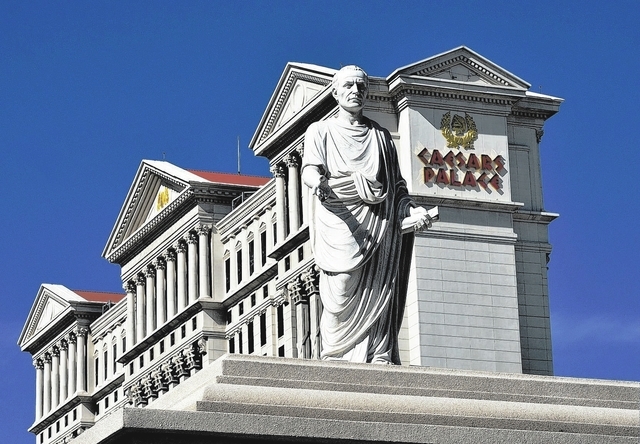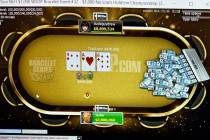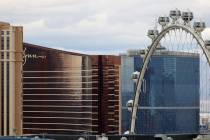Caesars’ moves don’t ease Street’s debt worries
Nothing is simple when it comes to Caesars Entertainment Corp.
Take last week’s announcement that the company is selling four casinos to its Caesars Growth Partners subsidiary for $2.2 billion.
Some analysts worried the deal would diminish the parent company’s results. Caesars is giving up valuable revenue and cash flow from three Strip casinos and Harrah’s New Orleans to a subsidiary in exchange for cash.
Caesars Growth Partners was created in 2013 to help repair the company’s balance sheet and deal with an industry-high $23 billion in long-term debt.
However, the question remains: Will Caesars do what is required to alleviate the much-criticized debt?
Deutsche Bank gaming analyst Andrew Zarnett, who specializes in high-yield securities, said Caesars’ management needs to focus on $3.06 billion of the debt coming due in 2015 and 2016.
He doubts that will happen.
In 2012, Caesars reinvested proceeds from its $610 million sale of Harrah’s St. Louis to Penn National Gaming in its casino properties instead of paying down debt.
“Given Caesars’ current performance and the status of capital markets, we believe that the company has very limited ability to refinance these maturities with like securities,” Zarnett told investors.
The four casinos — Harrah’s New Orleans, Bally’s Las Vegas, The Quad and The Cromwell, which opens in May — will join Planet Hollywood Resort, the under-construction Horseshoe Baltimore, the Octavius Tower at Caesars Palace and the company’s interactive gaming division under the Caesars Growth Partners umbrella when the deal closes by early summer.
Mitch Garber is CEO of Caesars Interactive and of Caesars Growth Partners.
Casino management won’t change. A shared-services joint venture will provide operating services to all of Caesars subsidiaries.
Wall Street has often looked harshly at Caesars’ balance-sheet maneuvers since 2008, when the company was taken private and saddled with debt in a $30.7 billion buyout.
Fitch Ratings Service gaming analyst Alex Bumazhny wasn’t upbeat about the latest transaction.
He told investors Caesars Entertainment has “an already weak free cash flow profile,” and said the transaction is a negative to creditors that further deteriorates some recovery prospects in event of default.
“(It) reflects another step toward moving assets away from the weaker Caesars Entertainment into healthier entities,” Bumazhny said.
He added the move isolates the properties and the lucrative interactive business from a potential bankruptcy restructuring.
There’s that ugly “b” word again.
Caesars Chairman and CEO Gary Loveman is adamant that the company will not file a Chapter 11 bankruptcy reorganization.
In a lengthy interview in November, Loveman acknowledged the company had “a very complicated capital structure,” but had taken several refinancing steps in the past year that gave the business $2 billion in cash on its balance sheet.
The most significant debt maturities don’t come due for another four years.
“We’re much better structured,” Loveman said. “There is nothing that would trigger a liquidity crisis. We don’t have anything like that.”
Loveman last week called the casino sales “an important step” to repair the company’s balance sheet. During a conference call to discuss the transaction, Loveman told analysts that Caesars Growth Partners is focused on what its name says — growth.
The Cromwell is a $185 million make-over of Bill’s Gamblin’ Hall. The Quad (formerly the Imperial Palace) will benefit when Caesars Growth Partners spends $223 million to upgrade the hotel’s 2,550 rooms.
Garber said both properties will offer rooms at a much higher nightly rate than in their previous lives.
Caesars Growth Partners is structured to make capital investments. Caesars Entertainment owns 58 percent of the entity, which is managed by Nasdaq-traded Caesars Acquisition.
Caesars’ private equity owners, TPG and Apollo Management Group, each put $500 million into Caesars Growth Partners. High-profile investors bought in, including hedge fund billionaire John Paulson, who owns 12 million shares. Soros Fund Management, the investment arm of billionaire George Soros, a high-profile supporter of liberal and progressive political causes, owns 6 million shares.
Loveman said Caesars Growth Partners properties will benefit from “significant capital investment to fulfill their potential.” That’s what the company was structured to do.
It was also structured to not live long. Caesars holds an option to buy back outstanding shares in three years.
Zarnett said last week’s move buys Caesars Entertainment management “additional time” to solve its high-leverage issues, based on the $1.8 billion it will net from the transaction. He said the company “remains focused” on addressing near-term maturities, rather than debt due in a few years.
“This transaction is clearly negative from a leverage perspective on Caesars Entertainment due to the loss of (cash flow) from the sale of the three assets,” Zarnett said. “A significant amount of debt reduction would be needed to offset the loss of (cash flow) to maintain neutral leverage.”
Caesars will announce quarterly and year-end results Tuesday. The company said it expects to report fourth-quarter revenue of $2.05 billion to $2.11 billion and a net loss of $1.7 billion to $1.82 billion
We won’t know for a while whether Caesars is just realigning the deck chairs on the Titanic.
Howard Stutz’s Inside Gaming column appears Sundays. He can be reached at hstutz@reviewjournal.com or 702-477-3871. Follow @howardstutz on Twitter.






















